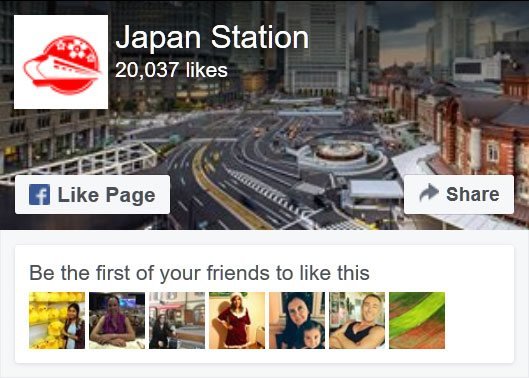Daijoji is a 700 year old temple and monastery nestled in the forested hills in southern Kanazawa. The historic temple is registered as an Important National Cultural Asset and though a little far from the city center, it is worth visiting to experience the peace and tranquility of its grounds. The temple also encourages both local people and foreign visitors to join in its meditation practice, with a special meditation event held every Sunday for anyone who wishes to join.
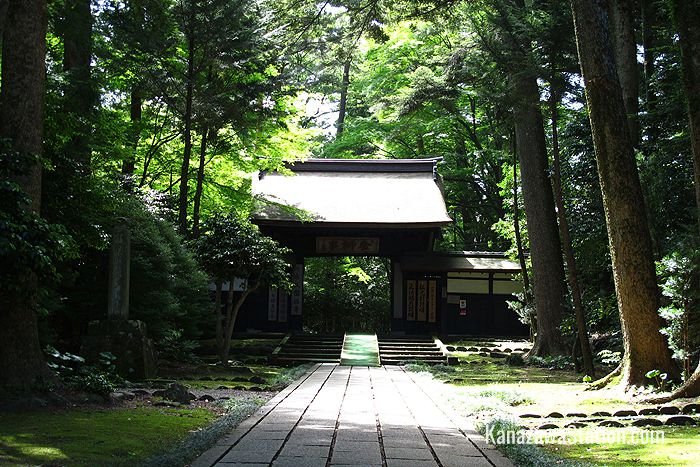
The Black Gate of Daijoji Temple
The History of Daijoji
Various dates are given for the founding of Daijoji Temple, but most sources agree that the temple was established in 1283 at a location to the south of Kanazawa in what is now Nonoichi City. Originally the temple belonged to the Shingon Buddhist sect but it became a Zen temple when Tettsu Gikai became its chief monk in 1293. Tettsu Gikai was an important spiritual leader of the Soto Zen religion which is the most common type of Zen Buddhism in Japan, and he spent the rest of his life at this temple. Over the centuries the temple was destroyed by war, and then rebuilt in Kanazawa, moving again to its current location in 1697. Today the temple is an isolated mountain monastery and home to a community of over 20 monks. The monks range in age from their 20s to their 70s and strive to live and work in harmony while undergoing strict daily training in Zazen style meditation.
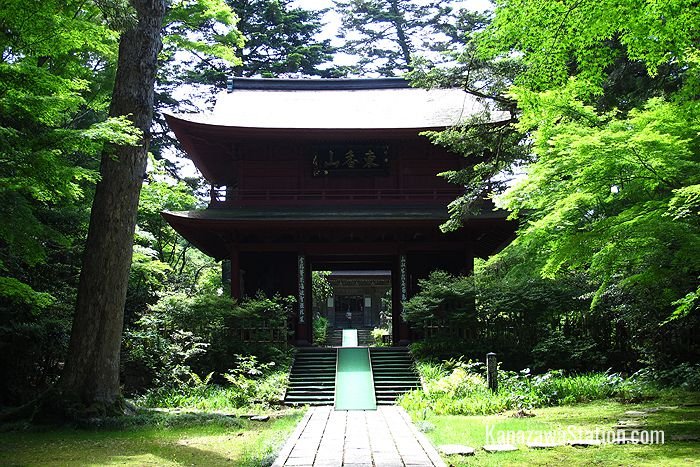
The Red Gate
What is Zen?
Zen is a style of Buddhism that originated in China and first came to Japan in the 12th century. In Zen Buddhism the most important practice is a type of meditation called Zazen. Meditation is seen as a way to understand yourself better. When you understand yourself better, you can improve your daily life and behavior and work for the benefit of others.
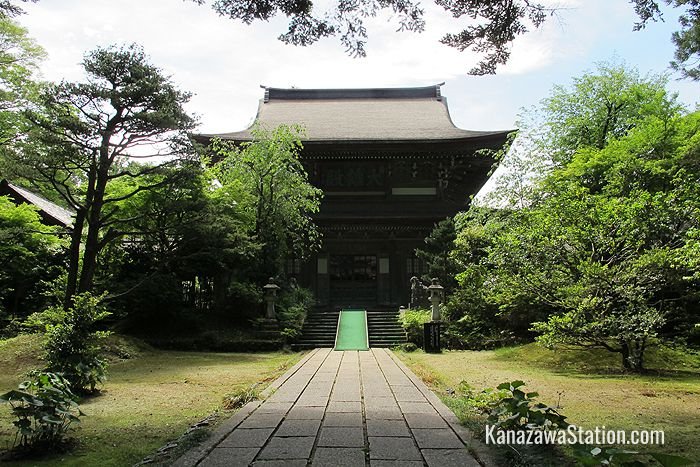
The Buddha Hall
How to Meditate
Meditation is a proven tool for managing stress, and improving concentration, and it is fairly easy to do. The three most important points to remember are posture, breath, and focus.
- Sit comfortably with a straight back and relax your neck and shoulders.
- Breath deeply and slowly.
- Focus on your breath coming in and out of your body.
And that’s it! You will have distracting thoughts, but that’s ok. All you need to do is return to focusing on your breath.
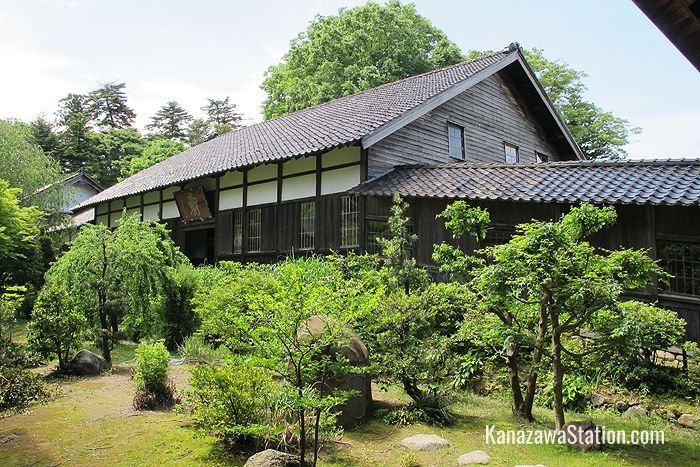
A sign in the meditation hall reads, “Please close the doors to keep out the bears”
Zen Practice at Daijoji
Those looking for more formal Zen training can find it at Daijoji. Here it is possible to join the monks as they sit and practice Zazen seated meditation. Daily two hour meditation sessions are held from 4.30am, followed by a morning service. On Sundays there is a regular meditation session for the local community and for visitors. The Sunday meditation begins at the more humane hour of 1.30pm, and is followed by a Buddhist talk from 3pm. This in turn is followed by a group chat over tea and a snack. For the full Zen experience short stays at the temple are also possible. While staying at the temple, visitors undergo training in the full Zen lifestyle, which includes joining the monks not only in meditation and prayer, but in daily cleaning and other chores. Guests can stay for between one and three nights, but to get the full benefit of this training course, the temple recommends at least a two night stay.
The Happiness Bell
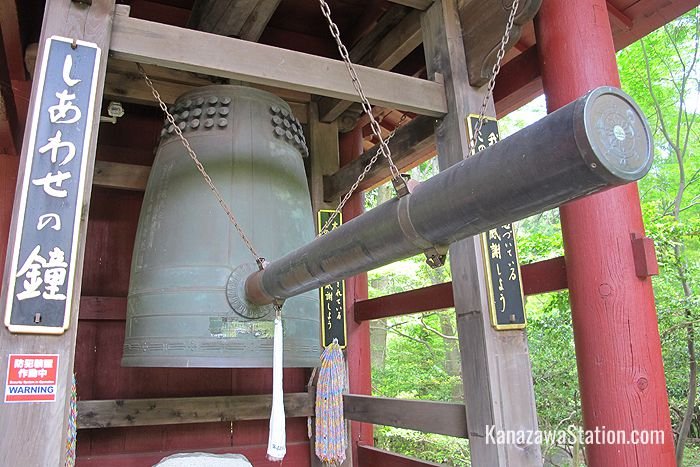
The happiness bell
By the temple’s Red Gate you will find the happiness bell. You can strike the bell and pray for happiness. This is how you do it.
- Face the bell and bow with your hands together in prayer.
- Take hold of the rope with both hands.
- Swing the rope lightly twice and on the third swing strike the bell.
- While the bell is ringing put your hands together and pray for happiness.
- Bow to the bell to say thank you!
Access
From Kanazawa Station’s East Exit bus terminal take local Hokutetsu buses #20, #21, or #22 for Heiwa-machi. The bus takes 20 minutes, costs 240 yen, and Daijoji is a 20 minute walk from the Heiwa-machi bus stop. The easiest way to reach the temple is by taxi which will take 25 minutes from Kanazawa Station and cost around 2000 or 2500 yen depending on the taxi company, time of day and the type of car.
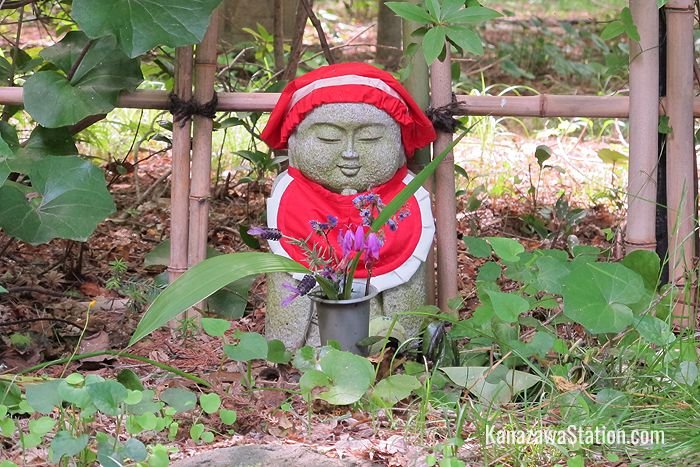
A bouquet for Jizo, the Buddhist patron saint of children and travelers
Telephone enquiries in Japanese can be made to the temple at: 076-241-2680
Email enquiries can be made here: [email protected]
Article and original photos by Michael Lambe. All rights reserved.
